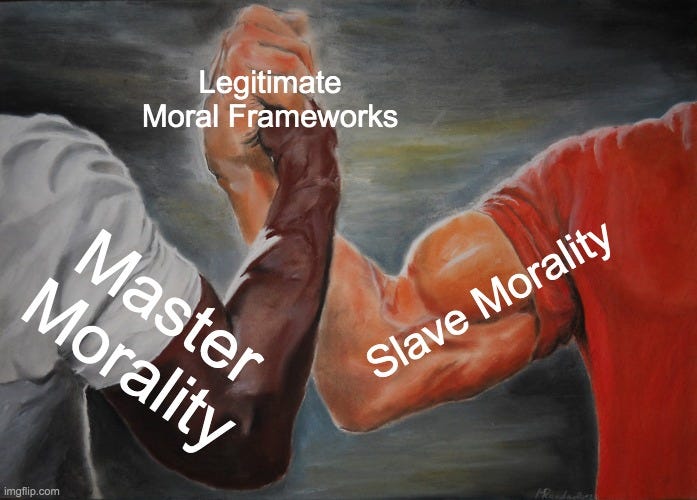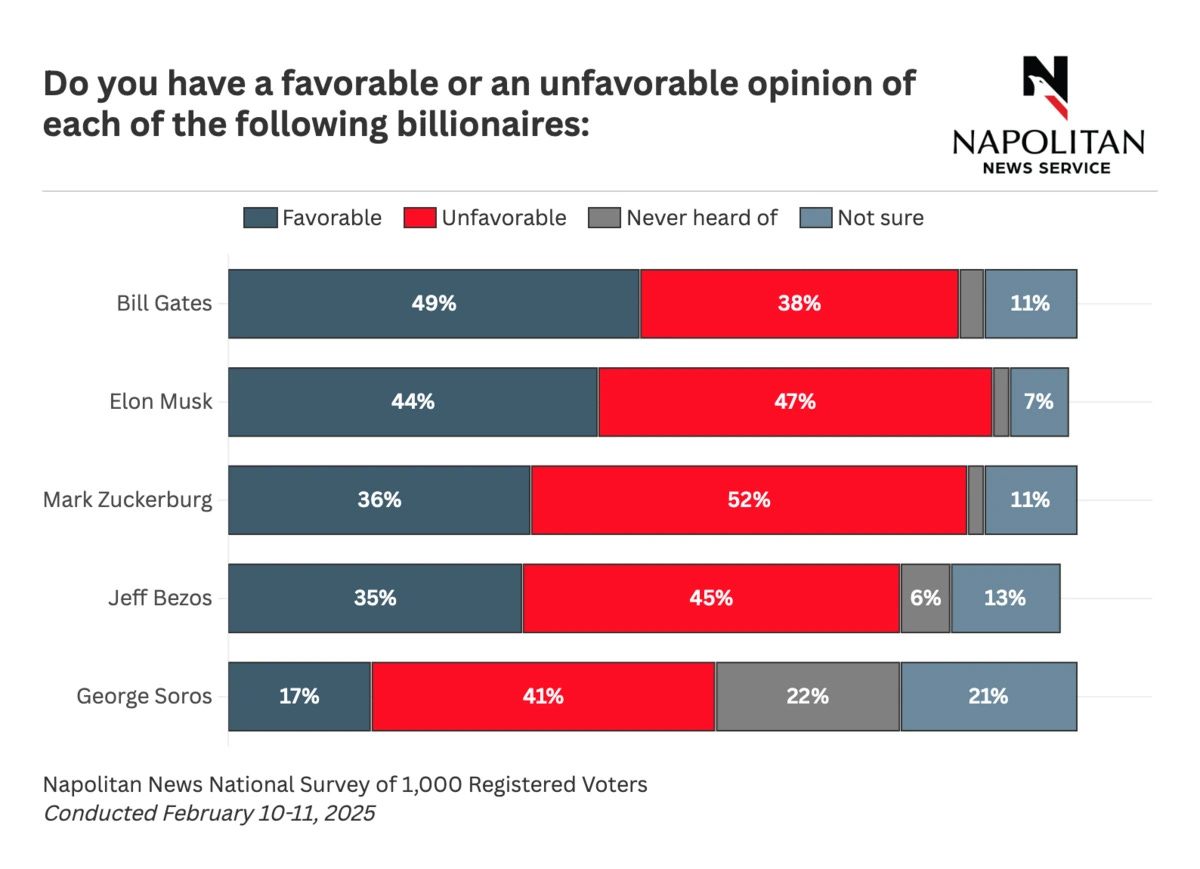A Semite is, for our purposes, a Jewish person. Doesn’t matter the type of Jew (reform, orthodox, American, Israeli, etc).
An anti-Semite is a person who presents a discriminatory bias against Jews. For example, a person choosing to keep their money under their mattress because “they don’t trust the Jews, and banks are run by Jews” is presenting an anti-Semitic opinion.
An anti-anti-Semite is a person who isn’t necessarily a Jewish ally but resents anti-Semitism and rails against it. Noted nihilist philosopher Friedrich Nietzsche once categorized himself in this way.
An anti-anti-anti-Semite is a brand-new category I made up last night. If you are a person who may or may not be Jewish but hates the pervasive anti-anti-Semitism currently ripping through American society, you may be an anti-anti-anti-Semite.
A Brief Nietzschean Detour
First, shoutout to Dr. Styers - subscriber of this blog and professor of the class where I learned about Mr. Nietzsche (RELI 530 - Genealogy of Religion; I highly recommend).
Nietzsche was a sad, sad man. He was extremely sickly, spending most of his life in his home, which likely contributed to his pioneering and nihilistic writings. He ultimately passed in 1900 at the age of 55, leaving behind a series of writings. His sister and her anti-Semitic, German nationalist husband curated the writings, which nearly destroyed Nietzsche’s legacy.
We spent an entire semester just poring through parts of two of his books, so we’re not going to make much of a dent in one blog post. Still, I distinctly remember Nietzsche’s “master/slave morality” theory, and I think it can be useful here, so let’s give it a try:1
The moral discrimination of values has either originated among a ruling group whose consciousness of its difference from the ruled was accompanied by delight - or among the ruled, slaved, and dependents of every degree.
In other words, the “master” has a set of values which promotes the virtues of aristocrats like leadership and courage while criticizing humility and lies. At the same time, the “slave” values things like generosity and problem-solving while maintaining a healthy skepticism of concepts like self-sacrifice and nobility. There is no claim that one morality is better than the other,2 simply that the two co-exist.
Jews: Masters? Slaves? Both? Neither?
Judaism is interesting because, depending on the framing, Jews could think of themselves as the master or the slave. I remember going to Hebrew school, when some classes would discuss how exceptional Jews were to have so much success within a tiny population, while other classes would talk about the Jewish history as slaves and victims and the persecution that chased us until the founding of Israel.
The result was a real mixed bag of perspectives within the community:
My mother and grandparents definitely focused more on a “master” morality which emphasized personal exceptionalism through working hard in school, playing music, developing manners, etc.
Meanwhile, at least one teacher at the Hebrew school would warn me that, without Israel as a “home”, our entire religious community would be at risk (even in the US). This feels more like “slave” morality, where we werre instructed to spend our energy helping others and thinking of the community, rather than working on ourselves.
Nietzsche himself considers Jews to be the classic example of “slaves”:
...the Jews achieved that miracle of inversion of values thanks to which life on earth has for a couple millennia acquired a new and dangerous fascination - their prophets fused "rich", "godless", "evil", "violent", "sensual" into one, and were the first to coin the word "world" as a term of infamy. It is this inversion of values (with which is involved the employment of the word for "poor" as a synonym for "holy" and "friend") that the significance of the Jewish people resides: With them, there begins the slave revolt in morals…
But the above quote doesn’t take into consideration the sweeping successes that Jews in America and around the world have found since his death in 1900.
So we’ve established that Jews may be hybrids. Does that mean they get to pick their morality alignment?
It Appears That Jews Are Picking Their Morality Alignments
Historically, the master is few in numbers and must always focus on consolidating their strength, while the slave has all the time in the world to invert the status quo. The core of the master-slave relationship is not for the slave to become the master, but for the master to be dragged down into the masses.
If you have wealth or power, or if the systemic forces at play in our society are interpreted to work in your favor, you may be categorized as an oppressor. This is bad, because, as social media has brought the masses closer together, slave morality appears to be having a moment.
After centuries of admiring the rich and powerful, the public has totally turned on them.
We hate billionaires! We say that they got lucky, that they built their wealth on the backs of others, that they’re hypocrites, that they’re destroying the planet to profit off of AI tech that may not be useful. As an aside, the president might be a billionaire, but he decries the nobility and courage of the masters.
So, circling back to the Jews, it seems that now is an opportune moment to tap into that slave morality. Why present yourself as a noble figure when you can tap into the public’s general sentiment that the “good” guy is the one who deserves the most pity?
Anti-Anti-Semitism In America Has Become A Weapon
1.
Lakewood, New Jersey’s Jewish population has grown from 40,000 to 65,000 since 2000, and more and more of the town’s resources have been diverted to fund solely Jewish endeavors. In fact, at one point in 2019, so much money had been mandated to bus the tens of thousands of Jewish kids to their private religious schools that the public school temporarily ran out of money.
Unsurprisingly, the town’s critics were (Jewish or not) were labeled as anti-Semites. But maybe it’s not anti-Semitism to suggest that they were choking out the public school for the non-Jewish kids who deserved an education, too.
2.
I think that things have gotten a lot more extreme since the Gaza protests and Trump’s win. Just yesterday, I was listening to a Cambridge Zoning Ordinance meeting where one of the topics of discussion was a Chabad (a temple for orthodox Jews). The group was pushing for a removal of limitations on religious buildings, so they could make their temple up to 74 feet tall without any approvals from neighbors or the town.
As you might expect, some people disagreed with this, and the conversation got salty. Apparently, there’s a lawsuit sponsored by the developers going on in the background which argues that Cambridge is violating religious freedoms by limiting the size of religious structures, and that the previous zoning decision was anti-Semitic. One neighbor used her public comment period to complain how, when she questioned whether the huge Chabad would bring heavy foot traffic to the neighborhood, the developers dismissed her as not understanding Judaism. Turns out she’s Jewish, too!
This portion of the meeting concluded with the council members calling the developers bullies for trying to force their plans through, and the developers calling the council members bullies for promoting anti-Semitism. Nice!
3.
And don’t even get me started on the administration’s use of anti-Semitism claims to try to remove funding from Harvard and Columbia. Most of them aren’t even Jewish! It’s just an alliance of convenience! Trump wants to go after the Free Palestine crowd because they’re woke, and the complaints of anti-Semitism gives his attacks a leg to stand on.
All of this is to say that I invite you to spread the gospel of anti-anti-anti-Semitism. As long as slave morality remains our collective code, people are always going to be tempted to accuse others of anti-Semitism (or racism or sexism) as a sort of trump card. Let’s save the term for when it actually applies, or it’s going to lose all of its meaning.
All of the following stems from Section 260 of Beyond Good and Evil.
Although Nietzsche certainly seems to admire master morality more, based on his tone.







Another fascinating analysis! I’m learning a lot from these. In fact, each section had at least one interesting takeaway. The council members and developers calling each other bullies — cue Spiderman meme — had me cracking up.
Can I be an anti-anti-anti-anti-Semite? (Jokes)